by Melanie Taylor | Jan 11, 2019

Be mindful and enjoy the moment.
Now that the busy holiday season is over, it’s a time to reflect on the past but prepare and refocus for the new year ahead. As we focus on the new year, it is always refreshing to have a clean slate. As the year begins to unfold, there are tips to help you manage your day-to-day stress levels. It begins with mindfulness.
What is mindfulness?
Mindfulness means paying attention in a particular way; on purpose, in the present moment, and non-judgmentally.” Dr. Jon Kabat-Zinn (1991)
Mindfulness is best thought of as a way of being rather than an activity Almost any activity can be carried out with mindful awareness.
Three Key Features of Mindful Awareness:
- Purpose – intentionally and purposefully directing your attention rather than letting it wander.
- Presence – being fully engaged with and attentive to the present moment. Thoughts about the past and future that arise are recognized simply as thoughts occurring in the present.
- Acceptance – being non-judgmental toward whatever arises in the moment. This means that sensations, thoughts, and emotions are not judged as good or bad, pleasant or unpleasant; they are simply noticed as “happening” and observed until they eventually pass (Naik, Harris and Forthun 2016).
Mindfulness is a mind-body practice that has been found to benefit both psychological and physical health. The primary psychological change that occurs during mindfulness practice is an increased awareness of thoughts, feelings, and sensations in the present moment. Over time, mindfulness practice can help you to become aware of the space between noticing experiences and reacting to them by letting you slow down and observe the processes of your mind (Black 2010).
The ultimate goal of mindfulness practice is for you to take advantage of this space so you can make more intentional decisions – to wake up from living life on autopilot, based on unproductive habits of mind
(Black 2010; Walach et al. 2007).
According to the American Psychological Association, some empirically supported benefits of mindfulness include the following (Davis & Hayes 2011):
Psychological Benefits
- Increased awareness of one’s mind
- Significantly reduced stress, anxiety, and negative emotions
- Increased control over ruminative thinking (a major cause and symptom of depression and anxiety)
- Increased mental flexibility and focus
- More working memory
- Decreased distracting thoughts
- Decreased emotional reactivity
- Increased capacity for intentional, responsive behaviors
- Increased empathy, compassion and conscientiousness of other’s emotions
Physiological Benefits
- Enhanced immune system functioning
- Increased brain density and neural integration in areas responsible for positive emotions, self-regulation, and long-term planning
- Lowered blood pressure
- Lowered levels of blood cortisol (a major stress hormone)
- Greater resistance to stress-related illnesses such as heart disease
Spiritual Benefits
- Increased self-insight and self-acceptance
- Increased acceptance of others
- Increased compassion and empathy
- Increased sense of morality, intuition, and courage to change
- Increased control over automatic behaviors
- Increased self-discipline
The question is, how many of us would like to benefit from mindfulness if it provides these positive benefits? All of us should strive to lower our stress level and enjoy our daily lives with a more positive attitude and more attentiveness. So, how can we incorporate this into our lives? The majority of this practice is about familiarizing yourself with what it feels like to be mindful, and getting better at “remembering” to maintain mindful awareness.
Experiment with creating your own mindfulness practices throughout your day. Being mindful of the sensation on the soles of your feet as you walk to your car or the taste and texture of your morning coffee can transform routine moments into deeply satisfying practices. However, having a ritualized and structured practice can be beneficial. To find out more about practicing mindfulness and how to incorporate a more structured practice in your life visit read Mindfulness: An Introduction.
Sources: Mindfulness: An Introduction. 2013, 2016. Retrieved from the UF/IFAS Extension Electronic Data Information System: https://edis.ifas.ufl.edu/fy1381. Publication #FCS2335
by Melanie Taylor | Dec 14, 2018

Aim to find JOY in this holiday season.
As the holiday season quickly approaches, many people are filled with extra holiday cheer and enthusiasm. Some are jolly but still overwhelmed with all of the activities, decorating, and shopping that needs to be completed. Then, there are those that find the holiday season as a reminder of things such as the death of a loved one, family feuds, divorce…the list goes on. If you are feeling this way, here are a few tips to make getting through the season a little bit easier.
- Feel your emotions – Many people want to suppress their sadness or anxiety, but this only makes it worse. We are all allowed to grieve, cry and feel mad at times. If you feel this way, let yourself feel your feelings. You will feel better once you have accepted and worked through the emotions. You also do not have to force yourself to feel happy just because it is the holiday season.
- Reach out to others – Instead of secluding yourself, spend time with others whether it’s at church, a community group or with family and friends. Spending time with others and socializing is good for the spirit.
- Volunteer – There are tons of volunteer opportunities during the holidays. Try something new and volunteer your time to a worthy cause. You’ll feel great about helping others and contributing to a cause.A national survey commissioned by UnitedHealth Group talked to 3,351 adults and found the majority of participants reported feeling mentally and physically healthier after a volunteer experience.
The research showed:
* 96% reported volunteering enriched their sense of purpose in life
* 94% of people said volunteering improved their mood
* 80% of them feel like they have control over their health
* 78% of them said volunteering lowered their stress levels
* 76% of people said volunteering has made them feel healthier
* About a quarter reported their volunteer work helped them manage a chronic illness by keeping them
active and taking their minds off of their own problems
* Volunteering improved their mood and self-esteem
- Be realistic – Realize that times and traditions change as families grow and age. Do not focus on things having to be the same every year. Be willing to accept changes, such as adult children may not be able to attend the family gathering, so utilize technology and talk through video conferencing, share pictures on email and/or Facebook. Find a way to make it work.
- Set aside differences for everyone’s sake. Aim to accept family and friends the way they are, even if they do not meet your expectations. Leave grievances at the door for the day and enjoy your family and friends. Share those grievances and talk at a more appropriate and private time. Also, remember they could be feeling the stress of the holiday too. So, be patient if someone is grouchy or sad as you celebrate. You may both be feeling the same way.
- Learn to say no – Be realistic in the number of activities you and your family can participate. Do not feel guilty because you cannot attend every party and event you are invited too. Graciously decline an invite and share that your schedule is booked, but thank them for thinking of you. A host does not expect that everyone will attend their parties.
- Take a breather as needed – If you start to feel overwhelmed with anxiety, anger or sadness take a few minutes to be alone. Take 15 minutes to spend in the quiet to reduce the stress and clear your mind. For example: listen to soothing music, do a few mindful breathing exercises to slow yourself down or read a book to temporarily escape the stress.
- Seek professional help as needed – there are times when the emotions are just too overwhelming to sort through on our own. If you continue to feel sad, anxious, angry, etc. there is absolutely no shame in seeking the help of a doctor or mental health professional. It will only help you work through your feelings with a non-bias person. Helping yourself feel better will improve your quality of life and those around you.
Learn to take care of yourself first. Learn your limitations and accept them. Don’t t let other’s expectations overwhelm you. Just remember when you start feeling extreme levels of emotions and/or stress, take a few deep breathes and remind yourself to relax and feel the moment. Be mindful of your surroundings and remind yourself of your many blessings even when going through difficult times. Make it your personal goal to feel your feelings and enjoy what you can about the holiday season whether it is the twinkling lights, time with friends and family, the food or any of the many special holiday traditions.
Striving for and maintaining a healthy lifestyle is an achievable goal and a National 4-H Council mission mandate for all of our 4-H members, families and volunteers. To learn more about healthy lifestyles and 4-H, find your local UF/IFAS Extension office.
Sources:
by Rachel Pienta | Sep 21, 2018
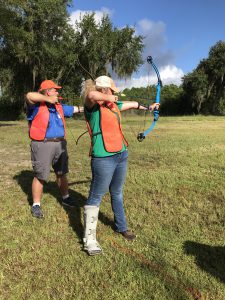
4-H Volunteers learn and practice the archery pre-shot routine so they can teach it to their youth. Photo: Julie P. Dillard
Ready to Lead
Sixteen 4-H volunteers joined ranks with one of Florida 4-H’s largest projects by earning their Level One Shooting Sports Instructor certification September 8. Training participants included 4-H volunteers and UF/IFAS Extension staff from Escambia, Holmes, Jefferson, Marion, Wakulla, Walton, Union and Alachua counties. What sets 4-H instructor training apart from other shooting sports trainings is the focus on youth life skills and positive youth development as opposed to focusing only on skill mastery.
About Florida 4-H Shooting Sports
The 4-H Shooting Sports Program teaches young people safe and responsible use of firearms, principles of archery and hunting basics. Lifelong skill development is one of the main benefits of involvement in the 4-H Shooting Sports Program and applies to both youth and adults involved in the program. Specifically, the 4-H Shooting Sports Program is designed to:
- Provide youth proper training in the use of firearms, archery equipment, and other areas of shooting sports.
- Provide thorough instruction in shooting sports safety.
- Develop life skills such as self-confidence, personal discipline, responsibility, and sportsmanship
- Create an appreciation and understanding of natural resources and their wise use.
- Provide volunteer instructors safe and proper instructional techniques.
- Show volunteer leaders how to plan and manage 4-H Shooting Sports Clubs. (Culen et al, 2018).
Resources for Success
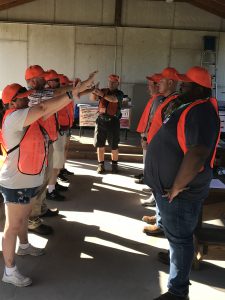
Establishing eye dominance is one of the first tasks of new member. Photo: Julie P. Dillard
It’s important to equip agents, volunteers and youth with the tools they need to succeed in the Florida 4-H Shooting . To assist you in organizing the county shooting sports program, here are some resources from the 4-H State Shooting Sports Committee and Environmental Sciences Action Team:
State Match Information, Rules and Risk Management
Youth Project Books
Getting Organized
To learn more about your county shooting sports program, contact your local 4-H agent.
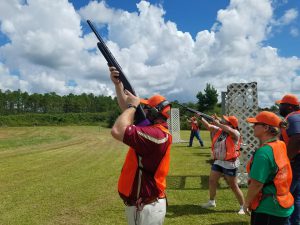
Wakulla 4-H Shooting Sports Club Leader, David Pienta, takes aim during shotgun instruction. Volunteers practice peer teaching to get ready to teach 4-H youth.
by Yolanda Goode | Sep 14, 2018
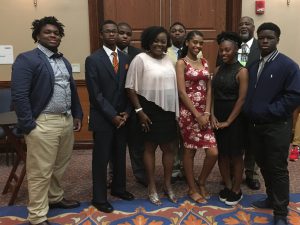
Gadsden County 4-H youth on campus for 4-H University. 4-HU is the premier youth leadership development event of Florida 4-H.
Leaders – Born or Made?
Many of us have heard the saying, “oh, that young man or woman is such a natural born leader.” But are leaders born that way, or do they develop into leaders? These Gadsden County delegates took advantage of 4-H University this summer – an awesome Florida 4-H state event designed to grow leadership skills. Many of them have also served as volunteer 4-H camp counselors during the summer. They understand that leaders are developed and not born.
What Defines a Leader?
Sometimes people confuse charisma with leadership abilities. Charisma is a special magnetic charm or appeal (Merriam-Webster Dictionary). Many of our local to national leaders have some level of charisma. In addition to charisma, leaders should have the more important skills such as communication, problem solving, critical thinking, managing, and self-awareness. There are many definitions for leadership because there is no universal definition. Leadership involves a process while a leader is the one who carries out the process.
How Does 4-H Unlock Your Leadership Potential?
One of my favorite teaching tools used to develop my Gadsden County 4-H leaders is the “Unlock Your Leadership Potential” by UF/IFAS Extension. It has influenced how I would define a leader. The overall goal of a good leader is to move the group or organization toward its goals while building a sense of togetherness and well-being.
Florida 4-H grows leaders at the club, county, district, and state levels by creating safe and nurturing environments and providing quality experiences. Knowledge and skills are great, but being able to apply them through experience is what fortifies and matures youth as well as increases their confidence. The 4-H slogan, “Learn by Doing”, is why the 4-H Experiential model is important to UF/IFAS-Extension 4-H Youth Development Program. The more active the youth and the duration of a their engagements in 4-H positive youth development the greater the benefits not just for them but also their communities (2013, National 4-H Council). It takes a whole team of Extension professionals, staff, 4-H Seniors, and volunteers to make the “magic” happen.
Call to Action:
- Begin the journey as a youth or volunteer: http://florida4h.org/getinvolved/
- Engage in local and state 4-H programs: http://florida4h.org/programsandevents_/
- Give to Florida 4-H: https://www.uff.ufl.edu/give-now/?fund_id=003603
- Read and share the other great blogs by my colleagues here: https://nwdistrict.ifas.ufl.edu/4hn/
- Join the “30 Days of Doing” 4-H Movement: https://4-h.org/inspire-kids-to-do/
References and Further Reading:
by Melanie Taylor | Jun 8, 2018
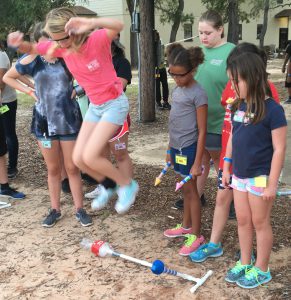
Gulf and Franklin County campers shooting rockets at Camp Timpoochee in June 2017.
As the school year wraps up, you’re likely trying to fill up your child’s summer with fun and educational programs. Fortunately, you’ll find a variety of day and residential summer camps out there. Does the thought of sending your child to camp cause anxiety for your or your child? If so, let’ me give you some tips to eliminate those concerns.
First, summer day camps and residential camps can be some of the most memorable events in a child’s life. Some children make memories and friends that last a lifetime. But as a parent, you need to feel comfortable about the camp you send your child to.
When starting the camp selection process, begin with your child’s interests. Make sure you know the camp will provide activities that will enhance your child’s personality and maturity level. Including your child in the process will help them feel more secure and excited about what camp will offer them. This will also help get rid of some of their anxiety because they’ll know what to expect (especially if they have never attended camp before).
Here are questions recommended by the American Camping Association (ACA) to help you make the best summer camp decision.
Questions to Consider in Selecting a Residential Camp:
- What locale do I want to consider? (mountains, oceanfront, distance from home, etc)
- Do I want a traditional camp that gives my child a wide variety of experiences, or do I want to select a specialty camp that focuses on a particular activity or set of skills?
- What size enrollment will make my child feel comfortable?
- How rustic do I want the camp to be?
- How structured do I want the program to be? Does my child like to have lots of choice in the activity schedule?
- Is my child ready to sleep away from home for an extended stay? (This will help you to select either a resident or day camp setting.)
- What session length will appeal to my child and to our family plans for the summer? (One week? Eight weeks? Length of day?)
- How can I stay in touch with my child during camp? Does the camp allow mail, phone calls or e-mail? Does the camp have parent visitation days?
- How will the camp meet my child’s special dietary or physical needs?
- What is my budget for camp tuition? (Remember, many camps offer financial aid.)
Questions to Consider in Selecting a Day Camp:
Day camps offer experiences unique from residential camps. Because of this, there are specific points to consider when choosing a day camp – transportation, overnights, swimming lessons, food service, horseback riding, group pictures, t-shirts, extended care, field trips, etc.
- Does the American Camp Association accredit the camp? (ACA has specific standards applicable only for day camps.)
- What training does the staff receive on safety, supervision, counseling, problem solving and other issues unique to working with young children?
- Is the price all-inclusive or are there extra charges?
- If transportation is offered, where is the closest pick-up location?
- Does the camp have an “express bus” which transports children quickly?
- If before and after-camp extended care is offered, who is with the children and what activities take place?
- Is lunch served, or do campers bring their own sack lunch? Are snacks and drinks provided?
- If the camp offers swimming, are there swimming lessons, or is it simply recreational swimming?
- Are campers in a group with a counselor all day? Or, are campers free to go from one activity to another with appropriate supervision? In this case, who would you talk to if you had a question or concern about your child?
- Is an open house offered before camp starts where you can meet your child’s counselor and van/bus driver?
- Are parents allowed to drop by for visits or is there a special parent visitation day?
Along with the above questions, you should also know that in the state of Florida, summer camps are not inspected or regulated by the Department of Children and Families (DCF). This makes it even more important for parents to gather information about the quality and safety of the program on their own. Parents should check to see if they are welcome to visit and observe the camp in action or attend activities with their child at any given time including water activities.
DCF suggests you ask these questions:
- What the programs health, safety and nutrition policies and procedures?
- Is the staff screened?
- What are the staff/child ratios and group sizes of the program?
- Is the staff well-trained?
- Is the program licensed or accredited?
- Are parents welcome to visit? Are family activities offered?
- Is there a daily lesson plan?
- Is the facility adequate for the number of children enrolled?
- What are the hours of operation, fees and payment procedures?
Download the Selecting Summer Care for School-Age Children: A Quality Checklist at http://www.dcf.state.fl.us/programs/childcare/docs/SummerChecklist.pdf.
Because you should know – Florida law does require summer camps to conduct background screenings of all camp personnel, including owners, operators, employees and volunteers. Volunteers providing less than 10 hours of service per month do not need to be screened as long as they are always within sight of a person who meets the screening requirement. In the state of Florida, the camps supported by UF/IFAS Extension meet each of the standards above.
The above questions and items to consider should help you in the camp selection process. Always feel confident in asking any questions – as the parent, you have the right to feel confident in your child’s camp selection.
As you begin your summer camp search, remember to check out the day and residential camping programs offered by your local 4-H program. We are confident in our volunteers and staff competency and would love to have your child participate in our safe and fun-filled summer camps. Contact your local Extension Office for more details.
Resources for this article may be found at: www.acacamps.org and www.myflfamilies.com.

by Niki Crawson | Apr 20, 2018
April is a month of many celebrations. Included in April’s celebrations is National Volunteer Appreciation Week. Our aim this month is to recognize some of the many dedicated 4-H volunteers that impact our youth in so many different ways. From robotics to agriculture, we have numerous outstanding volunteers that dedicate many hours and are rewarded with the joys of the impacts they make to our future leaders.
 OUR AIM
OUR AIM
4-H Shooting Sports is one of the largest youth development programs in the United States. Our aim is for certified volunteer instructors to teach young people to learn responsibility, self-confidence, and leadership abilities through the skills and disciplines of shooting sports such as archery. Though arrows are unpredictable and independent from the bow, archers depend on the bow to be the unchanging factor in an otherwise deliberate sport. Aim, draw and stance can determine the trajectory of each shot, but the bow always remains the constant, the foundation in the sport.
THE BOW
As a 4-H Agent, one can parallel archery to life as a 4-Her. As unpredictable as an arrow can be, it depends on the archer and the bow to make the shot. Life guides 4-Hers to try new things and take exciting adventures, but they still want and need a positive adult role model to rely on and guide them. Everyone needs a “bow,” that someone they can count on to be consistent in their lives. This is the relationship between a 4-Her and his or her 4-H volunteers; a sturdy foundation that fosters independence, confidence, and mastery of skills.
Even as the archer loves the arrow that flies, so too he loves the bow that remains constant.
– Nigerian Proverb
RANDY ADAMS
Meet Randy Adams, a Holmes County 4-H Volunteer, certified 4-H Archery Instructor, Club Leader for the past 4 years, and “archery bow” for many a 4-Her. Mr. Randy has been working with his 4-H club, the Dead Center Archery Club, on the safe and responsible use of the bow and arrow and believes he is passing on skills that some kids would not have the opportunity to learn otherwise. He leads his club by example, humor, and with ease. When asked what he found most challenging about volunteering, Mr. Randy stated having the extra energy to keep up with the kids in the afternoon!
Mr. Randy is an inspiration to his community and his 4-H family. Not letting some of his own health challenges stop him from his passion to help others, give back to his community and his love for archery and turkey hunting, he has pressed on to ensure that he teaches his hunting and archery skills, lead club meetings, and raise funds to assist youth to attend their first 4-H archery competitions and helped a 4-H family when illness struck.
A true example of 4-H leadership through the four H’s of Head, Heart, Hands, and Health, Mr. Randy teaches local youth many skills in his 4-H archery club. He reminds us that some of the greatest lessons learned in life are the simple ones – Life is not about winning, it is about succeeding. It is about a volunteer helping a 4-Her gain the courage to take a first shot and hitting the target.
To find out how you could impact our youth as a volunteer in your local UF IFAS County Extension Office, or for more information about programs like 4-H shooting sports, please visit http://florida4h.org.
http://florida4h.org/programsandevents_/shootingsports/
http://florida4h.org/programs/Shooting_Sports.pdf
http://www.4-hshootingsports.org/










